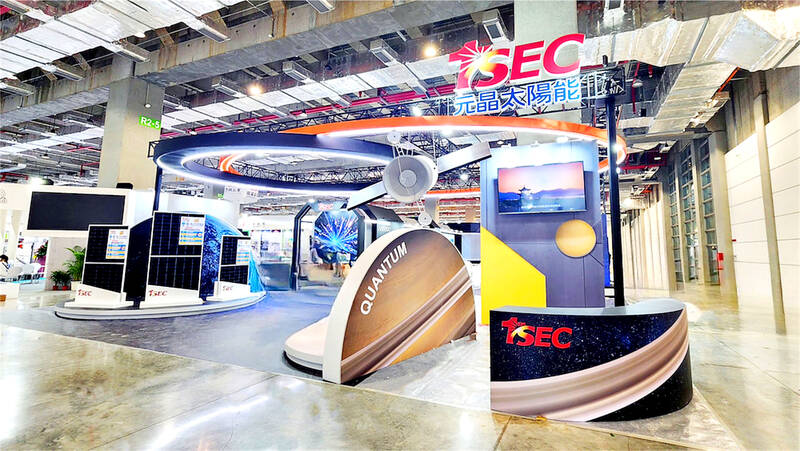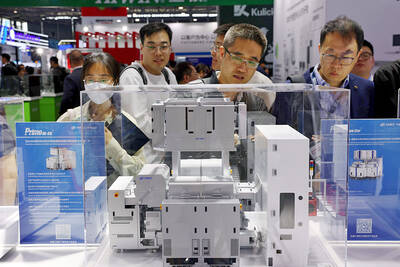Solar cell and module makers TSEC Corp (元晶) and Motech Industries Inc (茂迪) yesterday said they are aiming to boost their exposure to overseas markets, particularly the US, after the US government imposed preliminary duties on solar imports from their Southeastern Asian rivals.
TSEC, the nation’s biggest solar company with a 35 percent share of the domestic market, said this was the first major shift in its business strategy since 2018, when the company made a U-turn to focus on the local solar market.
“We are making strides to expand our reach to overseas markets. We hope to diversify our markets and product offerings, which would help to stabilize the company’s operations,” TSEC spokesman Henry Chiang (江郅豪) said.

Photo courtesy of TSEC Corp
TSEC aims to rapidly increase the proportion of solar cells it exports to about 30 percent next quarter and 50 percent next year, up from about 10 percent now, Chiang said,
“We are bullish about our growth in overseas markets, mainly Japan and the US. That is because the US has imposed duties on solar imports from Cambodia, Malaysia, Vietnam and Thailand. Major Chinese solar companies are scaling down their production in those countries,” Chiang said.
TSEC said it is in talks to supply solar cells to US customers, who are seeking suppliers outside of China as the US seeks to build a domestic solar supply chain and reduce dependence on Chinese suppliers.
However, TSEC has no plans to build a new solar cell plant in the US in the near term, the company said. In addition, the company is unclear whether it would be eligible to apply for US subsidies, it said.
Unlike many of its local peers, TSEC still makes money despite soft demand and weak prices.
However, its net profit of NT$52 million (US$1.63 million) in the first half of this year was down about 84 percent from a year earlier, with earnings per share of NT$0.10.
Motech yesterday said it had been approached by several potential customers from the US, Europe and India to source solar cells ahead of new US tariffs on solar imports, company president Fred Yeh (葉正賢) said.
As the outlook for the Taiwanese solar market looks bleak, Motech has concentrated efforts on overseas markets, which contribute more revenue than the domestic market, he said.
Solar panel installation in Taiwan is expected to plummet about 37 percent year-on-year to 1.7 gigahertz, compared with 2.7 gigherz last year, Motech estimated.
The company has begun to produce a new generation of TOPCon solar wafers called G10, which are larger than the previous generation M6 wafers, it said.
Motech started shipping solar modules containing the new G10 solar cells last month, it said. The new products boast a higher efficiency rate of 23.2 percent sunlight converted to electricity, it added.

With this year’s Semicon Taiwan trade show set to kick off on Wednesday, market attention has turned to the mass production of advanced packaging technologies and capacity expansion in Taiwan and the US. With traditional scaling reaching physical limits, heterogeneous integration and packaging technologies have emerged as key solutions. Surging demand for artificial intelligence (AI), high-performance computing (HPC) and high-bandwidth memory (HBM) chips has put technologies such as chip-on-wafer-on-substrate (CoWoS), integrated fan-out (InFO), system on integrated chips (SoIC), 3D IC and fan-out panel-level packaging (FOPLP) at the center of semiconductor innovation, making them a major focus at this year’s trade show, according

DEBUT: The trade show is to feature 17 national pavilions, a new high for the event, including from Canada, Costa Rica, Lithuania, Sweden and Vietnam for the first time The Semicon Taiwan trade show, which opens on Wednesday, is expected to see a new high in the number of exhibitors and visitors from around the world, said its organizer, SEMI, which has described the annual event as the “Olympics of the semiconductor industry.” SEMI, which represents companies in the electronics manufacturing and design supply chain, and touts the annual exhibition as the most influential semiconductor trade show in the world, said more than 1,200 enterprises from 56 countries are to showcase their innovations across more than 4,100 booths, and that the event could attract 100,000 visitors. This year’s event features 17

Germany is to establish its first-ever national pavilion at Semicon Taiwan, which starts tomorrow in Taipei, as the country looks to raise its profile and deepen semiconductor ties with Taiwan as global chip demand accelerates. Martin Mayer, a semiconductor investment expert at Germany Trade & Invest (GTAI), Germany’s international economic promotion agency, said before leaving for Taiwan that the nation is a crucial partner in developing Germany’s semiconductor ecosystem. Germany’s debut at the international semiconductor exhibition in Taipei aims to “show presence” and signal its commitment to semiconductors, while building trust with Taiwanese companies, government and industry associations, he said. “The best outcome

Semiconductor equipment billings in Taiwan are expected to double this year, as manufacturers in the industry are keen to expand production to meet strong global demand for artificial intelligence applications, according to SEMI, which represents companies in the electronics manufacturing and design supply chain. Speaking at a news conference before the opening of Semicon Taiwan trade show tomorrow, SEMI director of industry research and statistics Clark Tseng (曾瑞榆) said semiconductor equipment billings in Taiwan are expected to grow by an annual 100 percent this year, beating an earlier estimate of 70 percent growth. He said that Taiwan received a boost from a